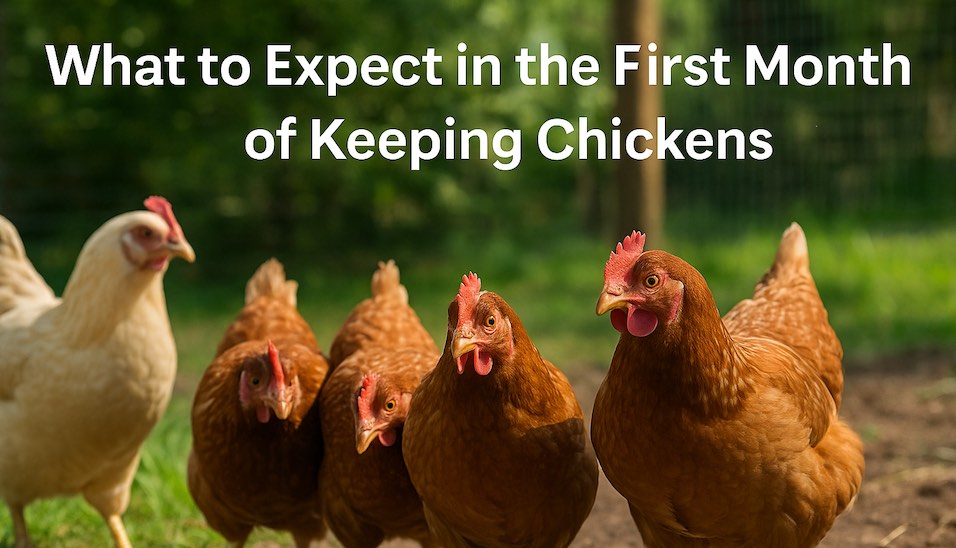Time Saving Hacks for Chicken Keepers
Time Saving Tips for Chicken Keepers
Life can get busy, but keeping chickens doesn't need to take up too much time. With a few simple chicken coop hacks, you can make caring for your flock easier.
Start by automating key tasks like feeding and watering. Automatic Chicken Drinkers and Automatic Chicken Feeders from Dine-A-Chook are great for saving time. They keep your chickens happy with fresh water and food, even when you’re not around.
If you like DIY projects, you could also build a DIY Chicken Waterer, which makes watering your chickens easy and stress-free.
Let’s look at more simple chicken hacks to help you save time and enjoy your flock even more.
1. Use a Droppings Board in the Coop
Cleaning the chicken coop can feel like a never-ending task, especially when it comes to dealing with droppings. But it’s important to keep things clean to protect your chickens from diseases and infections. Installing a droppings board under their roost is a simple way to make cleaning much easier. Chickens like to sleep on high perches, and a board underneath will catch most of the droppings, keeping the coop floor cleaner for longer.
Instead of frequently replacing floor litter, you can scrape the droppings board every day or two and toss the waste into a bucket or compost bin. This cuts down your coop cleaning to once a month or even less, especially if your chickens free-range during the day.
You can easily make a droppings board yourself. Metal or plastic sheets work best because they don’t absorb moisture and are easy to clean. Just scrape the board into a compost pile, and hose it down when needed. If you prefer using wood, try covering it with vinyl or even newspaper for easier cleaning. If DIY isn’t your thing, some pet stores sell pre-made droppings boards as well.

2. Use an Old Lawn Mower Grass Catcher as a Nesting Box
Help save the planet by recycling an old lawn mower catcher. Grass catchers from lawn mowers are perfect for nesting boxes. It is preferable to use solid plastic ones as the mesh fabric ones can allow mites and lice to breed.
Lawnmower catchers are cozy and dark so the chickens feel safe when nesting and laying. They are also really easy to hose out and keep clean.
How to use an old lawnmower catcher as a chicken nesting box:
- Lift the nesting boxes out of the coop by the handle
- Tip the used bedding into the bin or compost
- Wash the catcher out to clean and expel mites or lice
- Dry the catcher, add new bedding and put it back in the coop
It just doesn't get easier than that. Also if you have a broody hen, you can lift the catcher out at night and move her into a breeding pen without her waking.
If you're lucky, grass catchers will just slot into your existing nesting boxes. Or you can line them up along a shelf in the chicken coop. Install a droppings board above if the shelf is under the roosts. You can also install a few 2 x 4s and make a rack, but as not all grass catchers are the same size, this requires some planning.
But if you're looking for a more traditional solution, we also sell high-quality nesting boxes in our store.
3. Line Your Nesting Boxes with Old Newspapers
Cleaning out nesting boxes can be a time-consuming task, especially if your chickens decide to use them as a bathroom. One of the simplest chicken hacks to save time is to line your nesting boxes with old newspapers. Newspapers provide a soft and cushioned base for the eggs, and even if your hens scratch away most of the bedding, the paper helps prevent eggs from cracking.
When it's time to clean, simply lift out the newspapers, wrap them up with the old bedding, and toss them into the compost bin. This method not only saves time but also makes cleaning a lot easier. It’s a quick and cheap hack for busy chicken keepers that will pay off next time you need to tidy up.
4. Consider a Deep Litter System
A deep litter system is another great time-saver, though it requires a bit of planning. This method reduces how often you need to clean the coop—down to once or twice a year! It involves starting with 15–30 cm of high-carbon bedding material like straw, wood chips, or sawdust. As your chickens scratch and poop, the bedding starts to compost naturally, breaking down the waste.
Every few weeks, when you start to notice a smell or see that the litter looks dirty, just add a fresh layer of bedding. This keeps the system working. Over time, the bedding and manure will break down into compost, which can then be used in your garden. However, it’s important to get the balance right between carbon (the bedding) and nitrogen (the chicken manure).
Deep litter systems are better suited to cooler areas where they also provide some warmth in the coop during winter. Do your research, try to find someone in your area with deep litter success and count on a bit of trial and error before the system gels. Just keep thinking of how much time you save as a chicken keeper when you clean the coop every six to twelve months.
5. Get an Automatic Chicken Drinker
Watering your chickens every day can be time-consuming, especially with a larger flock. An Automatic Chicken Drinker solves this problem by providing a constant source of fresh water. You won’t need to refill waterers daily, saving you time and ensuring your chickens always have access to clean water.
For those who like DIY projects, a DIY Chicken Waterer is a great option. It’s easy to set up and customize for your coop’s needs. Automatic drinkers not only save time but also allow you to leave your chickens for a few days without worrying about their water supply. Pair this with an automatic feeder, and your chicken-keeping routine becomes almost effortless.
6. Install an Automatic Feeder
Feeding your chickens manually each day can take up valuable time, especially when you’re busy. An Automatic Chicken Feeder can help cut down on this task. These feeders store enough feed to last several days, and they only dispense food when your chickens peck at the mechanism. This reduces waste and makes sure the food stays clean and dry.
With an automatic feeder in place, you can go about your day without having to worry about rushing home to feed your flock. Plus, automatic feeders can help prevent pests like rodents from getting into the feed, saving you from additional coop maintenance.
Final Thoughts
With these simple chicken coop hacks, keeping chickens becomes a lot easier and less time-consuming. From installing droppings boards to using automatic drinkers and feeders, there are plenty of ways to simplify your chicken-keeping routine. By making small changes, you can spend less time on chores and more time enjoying your happy, healthy flock!
Also read: How to stop disease in the chicken coop




